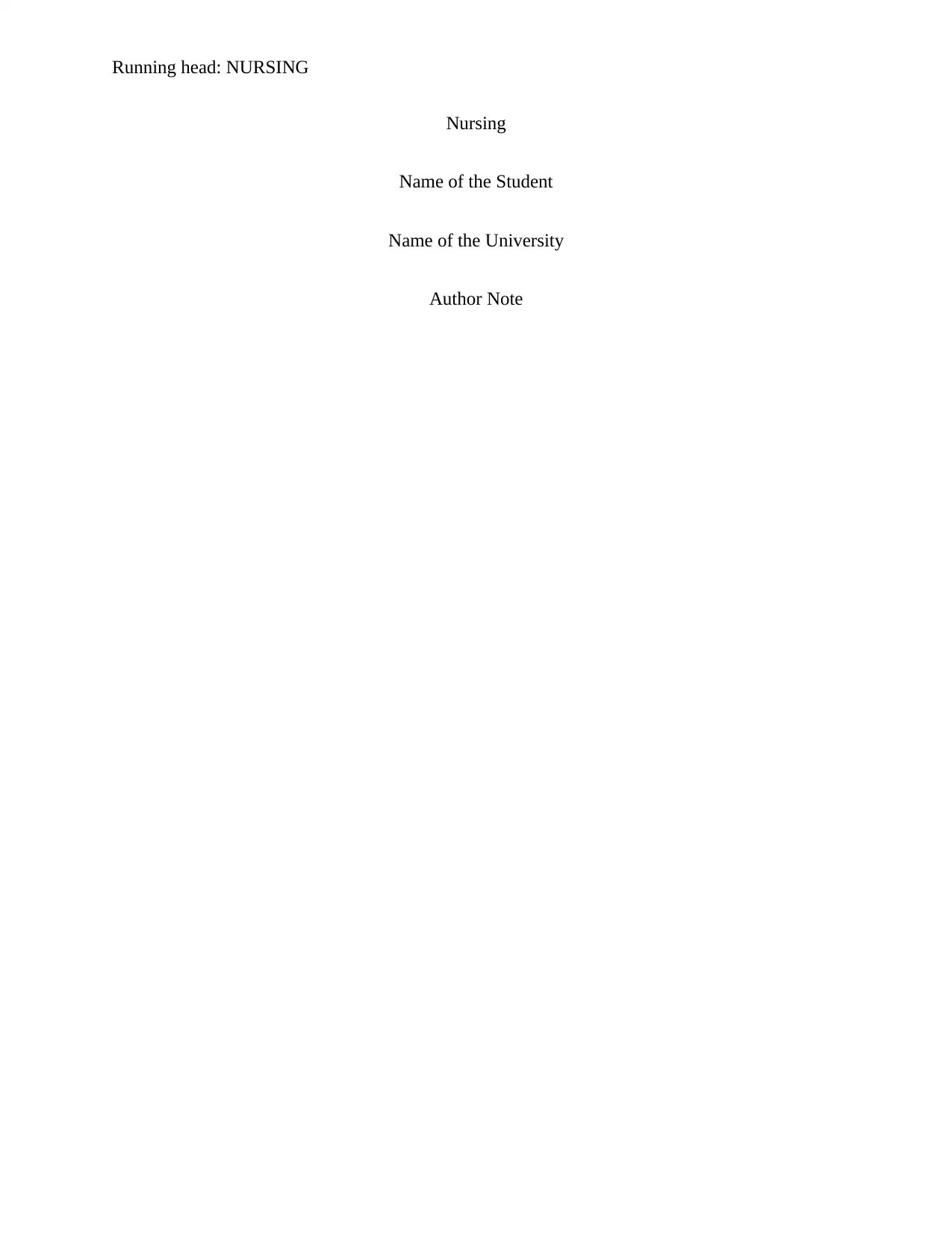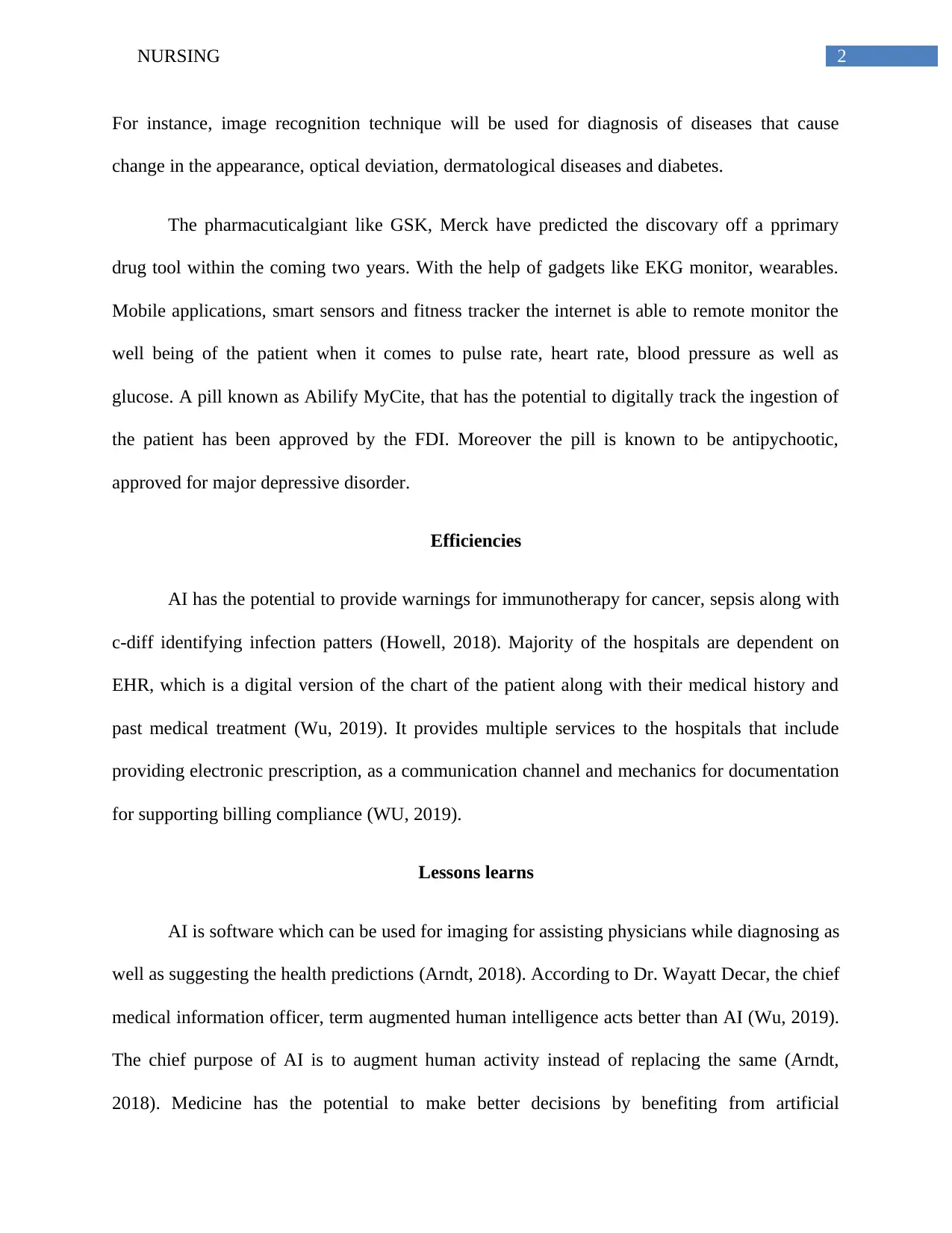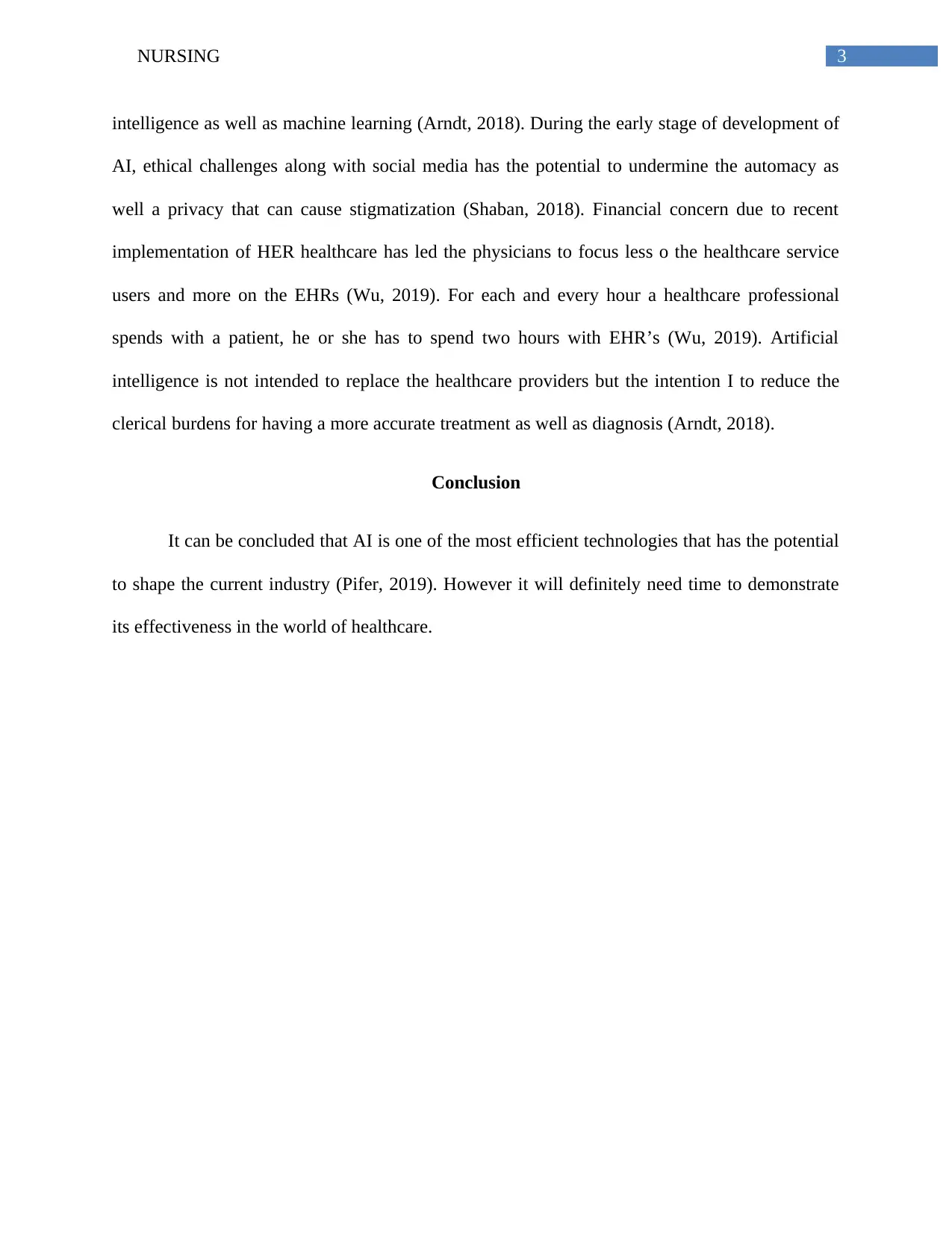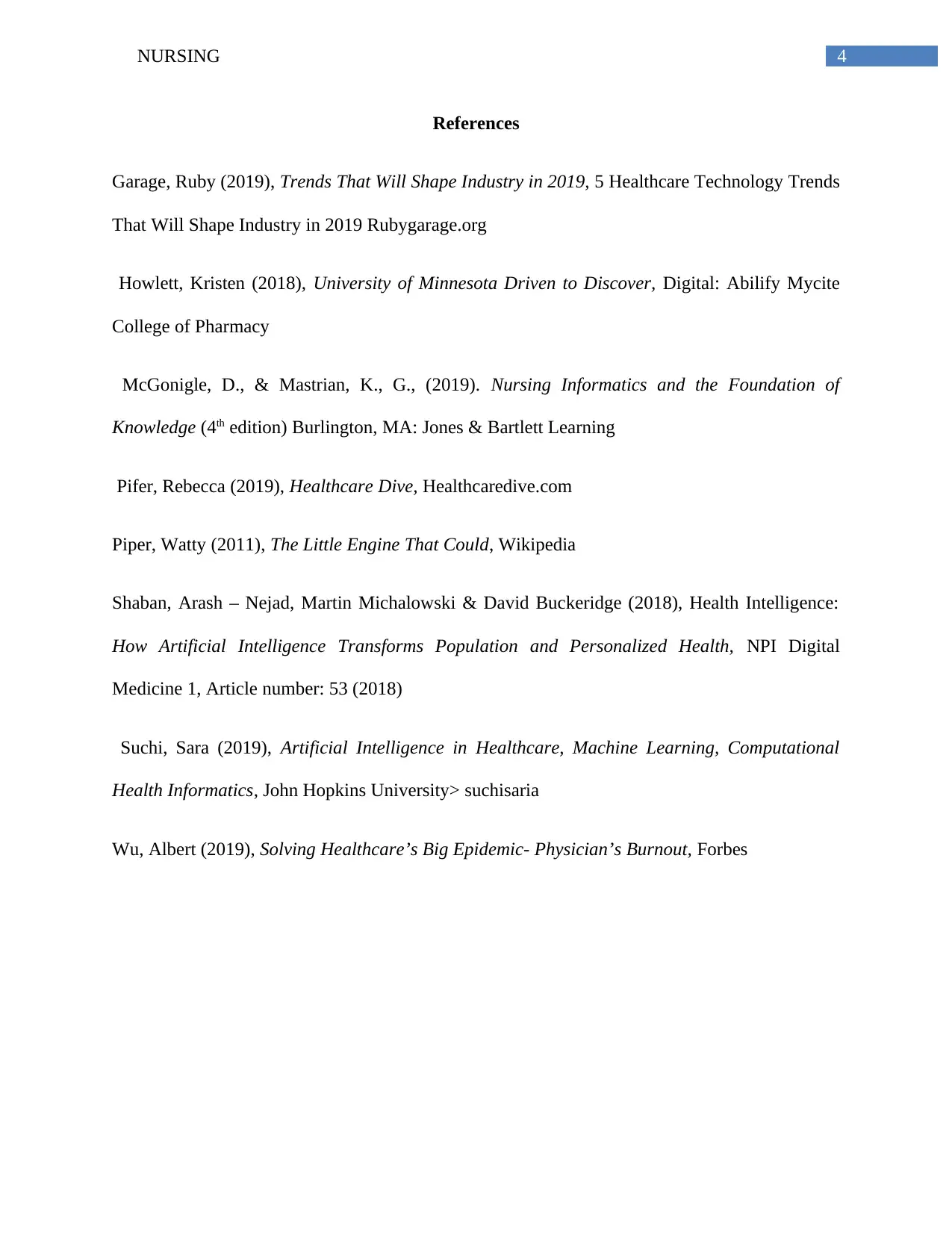Review of AI in Nursing: Efficiencies, Outcomes, and Practices
VerifiedAdded on 2023/01/23
|5
|1077
|62
Literature Review
AI Summary
This paper summarizes five peer-reviewed articles focusing on the impact of Artificial Intelligence (AI) on nursing practices and healthcare delivery. The review covers efficiencies, outcomes, and lessons learned from implementing AI in clinical systems. AI, defined as the use of complex algorithms to estimate human cognition in medical data analysis, is explored in the context of electronic health records (EHRs), diagnostic accuracy, and potential for self-diagnosis. The review highlights AI's potential to reduce errors, improve treatment, and alleviate clerical burdens for healthcare providers, while also acknowledging ethical challenges and the importance of augmenting human intelligence rather than replacing it. It concludes that AI holds promise for shaping the healthcare industry but requires further development to demonstrate its full effectiveness.

Running head: NURSING
Nursing
Name of the Student
Name of the University
Author Note
Nursing
Name of the Student
Name of the University
Author Note
Paraphrase This Document
Need a fresh take? Get an instant paraphrase of this document with our AI Paraphraser

1NURSING
In this paper, five peer review articles has been summarized along with explaining the
efficiencies, outcomes, nursing practices, lesson learned as well as healthcare delivery. The
search has been performed within the time range of last 5 years and the chief focus was oon
clinical systems for providing support for improving efficiencies as well as outcomes. The paper
has mainly focused on Artificial Intelligence (AI), a filed which deals with development,
conception, and tool based intelligent technologies as well as implementation of informatics
(McGonigle, 2018). The chief purpose of the paper is to assess the complex thought process as
well as intelligence of human beings.
Artificial intelligence (AI), when it comes to the healthcare industry, refers to the
complex software as well as algorithms used for estimating human cognition during analysis of
medical data (Suchi, 2019). It is also defined as the ability of the computer algorithms for
drawing approximate conclusion without direct input by human beings (Suchi, 2019). It is
considered to be one of the 5 crucial trends that has the potential to shape the industry in 2019
(Pifer, 2019). AI is expected to suppress 24 billion dollar b y the year 2025 compared to 2.1
billion dollars in the year 2018 (Pifer, 2019).
Improvement
It takes a lot more data compared to human brain in order to use AI more efficiently
(Garage, 2019). AI has the potential to reduce errors during diagnosis as well as treatment along
with allowing the doctors to work with greater number of patients (Garage, 2019). In future, i is
expected that individuals will gain the capacity of self diagnosis with the help of DIY medical
diagnosis (Garage, 2019). This will be done through apps by asking questions, processing the
histry of the patients along with demonstrating diagnosis based on the symptoms (Garage, 2019).
In this paper, five peer review articles has been summarized along with explaining the
efficiencies, outcomes, nursing practices, lesson learned as well as healthcare delivery. The
search has been performed within the time range of last 5 years and the chief focus was oon
clinical systems for providing support for improving efficiencies as well as outcomes. The paper
has mainly focused on Artificial Intelligence (AI), a filed which deals with development,
conception, and tool based intelligent technologies as well as implementation of informatics
(McGonigle, 2018). The chief purpose of the paper is to assess the complex thought process as
well as intelligence of human beings.
Artificial intelligence (AI), when it comes to the healthcare industry, refers to the
complex software as well as algorithms used for estimating human cognition during analysis of
medical data (Suchi, 2019). It is also defined as the ability of the computer algorithms for
drawing approximate conclusion without direct input by human beings (Suchi, 2019). It is
considered to be one of the 5 crucial trends that has the potential to shape the industry in 2019
(Pifer, 2019). AI is expected to suppress 24 billion dollar b y the year 2025 compared to 2.1
billion dollars in the year 2018 (Pifer, 2019).
Improvement
It takes a lot more data compared to human brain in order to use AI more efficiently
(Garage, 2019). AI has the potential to reduce errors during diagnosis as well as treatment along
with allowing the doctors to work with greater number of patients (Garage, 2019). In future, i is
expected that individuals will gain the capacity of self diagnosis with the help of DIY medical
diagnosis (Garage, 2019). This will be done through apps by asking questions, processing the
histry of the patients along with demonstrating diagnosis based on the symptoms (Garage, 2019).

2NURSING
For instance, image recognition technique will be used for diagnosis of diseases that cause
change in the appearance, optical deviation, dermatological diseases and diabetes.
The pharmacuticalgiant like GSK, Merck have predicted the discovary off a pprimary
drug tool within the coming two years. With the help of gadgets like EKG monitor, wearables.
Mobile applications, smart sensors and fitness tracker the internet is able to remote monitor the
well being of the patient when it comes to pulse rate, heart rate, blood pressure as well as
glucose. A pill known as Abilify MyCite, that has the potential to digitally track the ingestion of
the patient has been approved by the FDI. Moreover the pill is known to be antipychootic,
approved for major depressive disorder.
Efficiencies
AI has the potential to provide warnings for immunotherapy for cancer, sepsis along with
c-diff identifying infection patters (Howell, 2018). Majority of the hospitals are dependent on
EHR, which is a digital version of the chart of the patient along with their medical history and
past medical treatment (Wu, 2019). It provides multiple services to the hospitals that include
providing electronic prescription, as a communication channel and mechanics for documentation
for supporting billing compliance (WU, 2019).
Lessons learns
AI is software which can be used for imaging for assisting physicians while diagnosing as
well as suggesting the health predictions (Arndt, 2018). According to Dr. Wayatt Decar, the chief
medical information officer, term augmented human intelligence acts better than AI (Wu, 2019).
The chief purpose of AI is to augment human activity instead of replacing the same (Arndt,
2018). Medicine has the potential to make better decisions by benefiting from artificial
For instance, image recognition technique will be used for diagnosis of diseases that cause
change in the appearance, optical deviation, dermatological diseases and diabetes.
The pharmacuticalgiant like GSK, Merck have predicted the discovary off a pprimary
drug tool within the coming two years. With the help of gadgets like EKG monitor, wearables.
Mobile applications, smart sensors and fitness tracker the internet is able to remote monitor the
well being of the patient when it comes to pulse rate, heart rate, blood pressure as well as
glucose. A pill known as Abilify MyCite, that has the potential to digitally track the ingestion of
the patient has been approved by the FDI. Moreover the pill is known to be antipychootic,
approved for major depressive disorder.
Efficiencies
AI has the potential to provide warnings for immunotherapy for cancer, sepsis along with
c-diff identifying infection patters (Howell, 2018). Majority of the hospitals are dependent on
EHR, which is a digital version of the chart of the patient along with their medical history and
past medical treatment (Wu, 2019). It provides multiple services to the hospitals that include
providing electronic prescription, as a communication channel and mechanics for documentation
for supporting billing compliance (WU, 2019).
Lessons learns
AI is software which can be used for imaging for assisting physicians while diagnosing as
well as suggesting the health predictions (Arndt, 2018). According to Dr. Wayatt Decar, the chief
medical information officer, term augmented human intelligence acts better than AI (Wu, 2019).
The chief purpose of AI is to augment human activity instead of replacing the same (Arndt,
2018). Medicine has the potential to make better decisions by benefiting from artificial
⊘ This is a preview!⊘
Do you want full access?
Subscribe today to unlock all pages.

Trusted by 1+ million students worldwide

3NURSING
intelligence as well as machine learning (Arndt, 2018). During the early stage of development of
AI, ethical challenges along with social media has the potential to undermine the automacy as
well a privacy that can cause stigmatization (Shaban, 2018). Financial concern due to recent
implementation of HER healthcare has led the physicians to focus less o the healthcare service
users and more on the EHRs (Wu, 2019). For each and every hour a healthcare professional
spends with a patient, he or she has to spend two hours with EHR’s (Wu, 2019). Artificial
intelligence is not intended to replace the healthcare providers but the intention I to reduce the
clerical burdens for having a more accurate treatment as well as diagnosis (Arndt, 2018).
Conclusion
It can be concluded that AI is one of the most efficient technologies that has the potential
to shape the current industry (Pifer, 2019). However it will definitely need time to demonstrate
its effectiveness in the world of healthcare.
intelligence as well as machine learning (Arndt, 2018). During the early stage of development of
AI, ethical challenges along with social media has the potential to undermine the automacy as
well a privacy that can cause stigmatization (Shaban, 2018). Financial concern due to recent
implementation of HER healthcare has led the physicians to focus less o the healthcare service
users and more on the EHRs (Wu, 2019). For each and every hour a healthcare professional
spends with a patient, he or she has to spend two hours with EHR’s (Wu, 2019). Artificial
intelligence is not intended to replace the healthcare providers but the intention I to reduce the
clerical burdens for having a more accurate treatment as well as diagnosis (Arndt, 2018).
Conclusion
It can be concluded that AI is one of the most efficient technologies that has the potential
to shape the current industry (Pifer, 2019). However it will definitely need time to demonstrate
its effectiveness in the world of healthcare.
Paraphrase This Document
Need a fresh take? Get an instant paraphrase of this document with our AI Paraphraser

4NURSING
References
Garage, Ruby (2019), Trends That Will Shape Industry in 2019, 5 Healthcare Technology Trends
That Will Shape Industry in 2019 Rubygarage.org
Howlett, Kristen (2018), University of Minnesota Driven to Discover, Digital: Abilify Mycite
College of Pharmacy
McGonigle, D., & Mastrian, K., G., (2019). Nursing Informatics and the Foundation of
Knowledge (4th edition) Burlington, MA: Jones & Bartlett Learning
Pifer, Rebecca (2019), Healthcare Dive, Healthcaredive.com
Piper, Watty (2011), The Little Engine That Could, Wikipedia
Shaban, Arash – Nejad, Martin Michalowski & David Buckeridge (2018), Health Intelligence:
How Artificial Intelligence Transforms Population and Personalized Health, NPI Digital
Medicine 1, Article number: 53 (2018)
Suchi, Sara (2019), Artificial Intelligence in Healthcare, Machine Learning, Computational
Health Informatics, John Hopkins University> suchisaria
Wu, Albert (2019), Solving Healthcare’s Big Epidemic- Physician’s Burnout, Forbes
References
Garage, Ruby (2019), Trends That Will Shape Industry in 2019, 5 Healthcare Technology Trends
That Will Shape Industry in 2019 Rubygarage.org
Howlett, Kristen (2018), University of Minnesota Driven to Discover, Digital: Abilify Mycite
College of Pharmacy
McGonigle, D., & Mastrian, K., G., (2019). Nursing Informatics and the Foundation of
Knowledge (4th edition) Burlington, MA: Jones & Bartlett Learning
Pifer, Rebecca (2019), Healthcare Dive, Healthcaredive.com
Piper, Watty (2011), The Little Engine That Could, Wikipedia
Shaban, Arash – Nejad, Martin Michalowski & David Buckeridge (2018), Health Intelligence:
How Artificial Intelligence Transforms Population and Personalized Health, NPI Digital
Medicine 1, Article number: 53 (2018)
Suchi, Sara (2019), Artificial Intelligence in Healthcare, Machine Learning, Computational
Health Informatics, John Hopkins University> suchisaria
Wu, Albert (2019), Solving Healthcare’s Big Epidemic- Physician’s Burnout, Forbes
1 out of 5
Related Documents
Your All-in-One AI-Powered Toolkit for Academic Success.
+13062052269
info@desklib.com
Available 24*7 on WhatsApp / Email
![[object Object]](/_next/static/media/star-bottom.7253800d.svg)
Unlock your academic potential
Copyright © 2020–2026 A2Z Services. All Rights Reserved. Developed and managed by ZUCOL.





